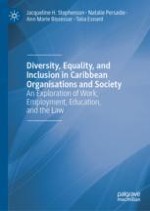This book focuses on equality, inclusion, and discrimination within the English-speaking Caribbean region, specifically as it relates to employment, education, society, and the law. Though anti-discrimination laws have recently been enacted in the Caribbean, this, in and of itself, neither translates to societal changes nor changes within the organisational context. The authors examine racial diversity in public sector organisations in Trinidad and Tobago and Guyana, gender diversity in organisations across the Caribbean region, sexual orientation and its impact on employment, disability and access within organisations, and equality and inclusion within Caribbean institutions of higher education. Further, the book explores the region’s equality laws and compares them with legislation from selected developed countries. This interdisciplinary text provides researchers in HRM, organisational behavior, sociology, and public policy with an overview of the types of discrimination prevalent within the Caribbean as well as the varied institutional frameworks in place that encourage equality.
